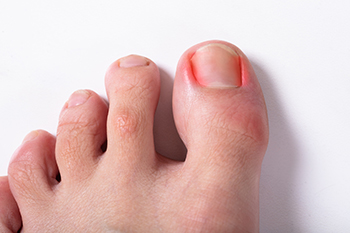


 An ingrown toenail occurs when the toenail curls and grows into the skin surrounding the nail. Ingrown toenails usually become painful, red and swollen, and if left untreated, they can become infected. Common situations that cause ingrown toenails include wearing tight fitting shoes, improperly cutting the toenails, having sweaty feet, or sustaining a toe injury. If you are struggling with an ingrown toenail, soaking the feet in warm water for 15-20 minutes, 3-4 times a day is recommended. However, if the ingrown toenail persists, it is important to have it checked by a podiatrist in order to prevent an infection. In severe cases, a podiatrist may need to remove the nail via surgery.
An ingrown toenail occurs when the toenail curls and grows into the skin surrounding the nail. Ingrown toenails usually become painful, red and swollen, and if left untreated, they can become infected. Common situations that cause ingrown toenails include wearing tight fitting shoes, improperly cutting the toenails, having sweaty feet, or sustaining a toe injury. If you are struggling with an ingrown toenail, soaking the feet in warm water for 15-20 minutes, 3-4 times a day is recommended. However, if the ingrown toenail persists, it is important to have it checked by a podiatrist in order to prevent an infection. In severe cases, a podiatrist may need to remove the nail via surgery.
Ingrown toenails may initially present themselves as a minor discomfort, but they may progress into an infection in the skin without proper treatment. For more information about ingrown toenails, contact our podiatrist of Dr. Powers Foot and Ankle. Our doctor can provide the care you need to keep you pain-free and on your feet.
Ingrown Toenails
Ingrown toenails are caused when the corner or side of a toenail grows into the soft flesh surrounding it. They often result in redness, swelling, pain, and in some cases, infection. This condition typically affects the big toe and may recur if it is not treated properly.
Causes
You are more likely to develop an ingrown toenail if you are obese, have diabetes, arthritis, or have any fungal infection in your nails. Additionally, people who have foot or toe deformities are at a higher risk of developing an ingrown toenail.
Symptoms
Some symptoms of ingrown toenails are redness, swelling, and pain. In rare cases, there may be a yellowish drainage coming from the nail.
Treatment
Ignoring an ingrown toenail can have serious complications. Infections of the nail border can progress to a deeper soft-tissue infection, which can then turn into a bone infection. You should always speak with your podiatrist if you suspect you have an ingrown toenail, especially if you have diabetes or poor circulation.
If you have any questions, please feel free to contact one of our offices located in Bloomington, Bedford, and Washington, IN . We offer the newest diagnostic and treatment technologies for all your foot care needs.